
Algorithms for Molecular Biology
Scope & Guideline
Exploring the intersection of computation and molecular science.
Introduction
Aims and Scopes
- Algorithm Development and Optimization:
The journal prioritizes research that introduces new algorithms or optimizes existing ones, particularly those that address computational challenges in bioinformatics and molecular biology. - Data Structures and Computational Efficiency:
A significant focus is placed on the design of efficient data structures that facilitate faster computations in the analysis of biological data, including genomic sequences and molecular interactions. - Statistical and Probabilistic Models:
Research involving statistical methodologies and probabilistic models is central, particularly in phylogenetics, population genetics, and evolutionary biology. - Applications in Genomics and Proteomics:
The journal emphasizes practical applications of algorithms in genomics and proteomics, including gene mapping, sequence alignment, and structural biology. - Interdisciplinary Approaches:
A unique contribution of the journal is its encouragement of interdisciplinary methodologies, combining insights from computer science, mathematics, and biology to tackle complex biological problems.
Trending and Emerging
- Machine Learning and Artificial Intelligence in Bioinformatics:
There is a growing trend towards incorporating machine learning and artificial intelligence techniques into bioinformatics, demonstrating their effectiveness in predictive modeling and data analysis. - Graph-Based Algorithms:
The use of graph-based algorithms is increasingly prevalent, particularly in the context of genomic data analysis, pangenomics, and complex biological networks. - Single-Cell Genomics and Analysis:
Research focusing on single-cell genomics is on the rise, reflecting the importance of understanding cellular heterogeneity and its implications in health and disease. - Integration of Multi-Omics Data:
There is an emerging focus on algorithms that integrate various omics data (genomics, proteomics, transcriptomics), highlighting the need for comprehensive analyses of biological systems. - Dynamic Programming in RNA Biology:
Dynamic programming approaches for RNA folding and structure prediction are increasingly emphasized, reflecting advancements in understanding RNA biology and its computational challenges.
Declining or Waning
- Traditional Phylogenetic Methods:
There is a noticeable decrease in the publication of traditional phylogenetic methods, as newer, more efficient algorithms and machine learning techniques gain traction. - Basic Sequence Alignment Techniques:
Basic sequence alignment techniques are appearing less frequently, likely due to the rise of advanced methods that incorporate structural information or machine learning. - Static Models in Population Genetics:
Research focused on static models within population genetics is waning, with a shift towards dynamic and adaptive models that better reflect real-world biological processes. - Single-Method Approaches:
The journal is moving away from studies that rely solely on a single computational method, favoring more integrative approaches that combine multiple techniques for more robust results.
Similar Journals
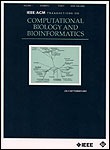
IEEE-ACM Transactions on Computational Biology and Bioinformatics
Empowering Research with Quantitative Methods and Computational TechniquesIEEE-ACM Transactions on Computational Biology and Bioinformatics is a prestigious journal published by the IEEE Computer Society, focusing on the interdisciplinary field of computational biology and bioinformatics. Established in 2004, this journal has made significant strides in contributing to our understanding of complex biological systems through quantitative methods and computational techniques, and it spans a converged publication period through 2024. As a notable resource with an impact factor that positions it in the second quartile in the domains of Applied Mathematics, Biotechnology, and Genetics, it serves as an essential platform for researchers and professionals seeking to disseminate their findings to a global audience. The journal ranks impressively in Scopus, with Applied Mathematics holding a rank of #38 out of 635 (94th percentile) and Genetics at #86 out of 347 (75th percentile), highlighting its significant influence in the scientific community. While the journal is not open-access, it provides valuable insights and cutting-edge research that are crucial for advancing the fields of bioinformatics and computational biology, making it indispensable for students, researchers, and practitioners alike.
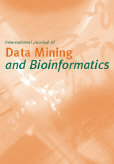
International Journal of Data Mining and Bioinformatics
Bridging Data Science and Biological Insights.The International Journal of Data Mining and Bioinformatics, published by InderScience Enterprises Ltd, stands as a crucial platform for researchers and professionals dedicated to the intersection of data science and biological informatics. With its ISSN 1748-5673 and E-ISSN 1748-5681, this journal captures the essence of innovative research from 2006 to 2024. Though indexed in the Q4 category for Biochemistry, Genetics and Molecular Biology and Information Systems, it maintains a respectable Q3 status in Library and Information Sciences, reflecting its growing influence within the academic community. The journal also provides insightful contributions to the fields of big data analytics, machine learning, and computational biology. Although it is not currently an open-access journal, its relevance is underscored by its Scopus rankings, indicating a solid standing in the disciplines it encompasses. Researchers, students, and practitioners in data mining and bioinformatics are encouraged to explore the findings and methodologies presented, paving the way for future innovations in this dynamic field.
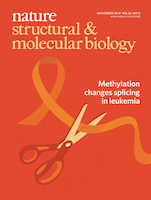
NATURE STRUCTURAL & MOLECULAR BIOLOGY
Pioneering Insights in Structural BiologyNATURE STRUCTURAL & MOLECULAR BIOLOGY is a leading journal published by NATURE PORTFOLIO, dedicated to advancing the field of molecular and structural biology since its inception in 1998. With an impressive impact factor that places it in the Q1 quartile across both the Molecular Biology and Structural Biology categories, this journal is pivotal for researchers and professionals seeking to publish innovative and high-impact results. Its Scopus ranking further highlights its elite status, with a remarkable 98th percentile for Structural Biology and 95th for Molecular Biology. While the journal does not currently offer open access, it continues to foster a rich discourse among scientists by providing a platform for the dissemination of groundbreaking research. Located in the United Kingdom and operated from Berlin, the journal's commitment to excellence positions it as an indispensable resource for students, researchers, and practitioners in the realms of biochemistry, genetics, and molecular biology.
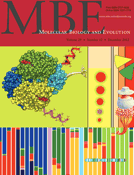
MOLECULAR BIOLOGY AND EVOLUTION
Exploring the Frontiers of Life's ComplexityMOLECULAR BIOLOGY AND EVOLUTION, published by Oxford University Press, stands as a premier journal in the fields of molecular biology, evolutionary biology, and genetics. With a proud history dating back to its inception in 1983, the journal spans a convergence period through 2024, providing an exceptional platform for disseminating high-quality research. The journal is recognized in the top Q1 quartile across multiple categories, including Ecology, Evolution, Behavior and Systematics, and Genetics, reflecting its significant impact and relevance in these disciplines. With impressive Scopus rankings—10th in Ecology and Evolution, 12th in Genetics, and 22nd in Molecular Biology—it serves as a vital resource for scholars aiming to stay informed on cutting-edge developments in evolutionary processes and molecular genetics. While it currently does not offer open access, its curated contents resonate well with an audience of researchers, professionals, and students deeply interested in accelerating their understanding of the complexities of life through an evolutionary lens.

Quantitative Biology
Bridging Mathematics and Biology for Innovative DiscoveriesQuantitative Biology is a prestigious journal published by WILEY, focusing on the interdisciplinary study of quantitative approaches in the biological sciences. With an ISSN of 2095-4689 and an E-ISSN of 2095-4697, this journal has established itself as a critical platform for researchers exploring complex biological systems through mathematical and computational methodologies. Operating out of China, Quantitative Biology significantly contributes to its field, holding a Q2 ranking in various categories, including Applied Mathematics and Biochemistry, Genetics and Molecular Biology, according to the latest Scopus rankings. These rankings reflect the journal's commitment to publishing high-quality research that employs advanced modeling and simulation techniques. The journal's impact is evident with its position in the 84th percentile for Applied Mathematics, indicating its relevance and growth in a competitive academic landscape. Although it does not currently operate under an Open Access model, the journal is pivotal for professionals and students alike, aiming to bridge the gap between mathematical theories and biological applications. Researchers are encouraged to submit their innovative findings and engage with the vibrant community dedicated to advancing the quantitative understanding of biological phenomena.

Journal of Bioinformatics and Computational Biology
Navigating the Future of Bioinformatics ResearchThe Journal of Bioinformatics and Computational Biology, published by WORLD SCIENTIFIC PUBL CO PTE LTD, serves as a significant platform for disseminating innovative research in the dynamic fields of bioinformatics and computational biology. With an ISSN of 0219-7200 and an E-ISSN of 1757-6334, this journal facilitates the exchange of ideas and advancements from its inception in 2003 and continues to be pivotal through 2024. Despite its classification in the lower quartiles—Q4 in Biochemistry and Q4 in Molecular Biology, along with Q3 in Computer Science Applications—the journal remains a valuable resource for researchers and students alike, as it emphasizes interdisciplinary approaches essential for tackling complex biological problems through computational methods. Located in Singapore, the journal encourages submissions of high-quality, peer-reviewed articles that offer insights into computational techniques that empower biological research. Although this journal does not offer open access options, its contributions to research are increasingly recognized across various academic platforms. As the field evolves rapidly, this journal continues to attract a growing readership, making it an essential reference point for anyone interested in the intersection of biology and computer science.
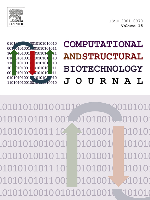
Computational and Structural Biotechnology Journal
Fostering Discoveries at the Intersection of Technology and Life SciencesComputational and Structural Biotechnology Journal is a premier open-access journal published by Elsevier, focusing on the intersection of computer science and molecular biology. Since its inception in 2012, the journal has established itself as a leading platform for innovative research, featuring groundbreaking studies in biochemistry, biophysics, biotechnology, and genetics. With a remarkable Q1 ranking in multiple categories, including Biochemistry and Genetics, it stands out for its high impact, evidenced by its strong Scopus ranking percentile scores. As a vital resource for researchers, professionals, and students, the journal aims to foster the dissemination of essential findings that leverage computational techniques to explore complex biological systems. In a rapidly evolving scientific landscape, Computational and Structural Biotechnology Journal serves as an indispensable resource for those looking to contribute and stay abreast of major advancements in the field.
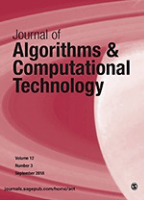
Journal of Algorithms & Computational Technology
Fostering Collaboration in Algorithmic Research and PracticeJournal of Algorithms & Computational Technology, published by SAGE PUBLICATIONS LTD, serves as a noteworthy platform for scholars and practitioners in the realms of applied mathematics, computational mathematics, and numerical analysis. With an ISSN of 1748-3018 and an E-ISSN of 1748-3026, this Open Access journal has been disseminating high-quality research since 2007, ensuring that significant advancements in algorithmic techniques and computational methodologies are readily accessible to the global academic community. Based in the United Kingdom, this journal has steadily established itself within specialized quartiles, notably achieving Q3 ranking in Computational Mathematics and Q4 in both Applied Mathematics and Numerical Analysis for 2023, reflecting its growing influence in these fields. As the journal converges from 2011 to 2024, it aims to cater to the needs of researchers, professionals, and students by publishing innovative research that not only addresses theoretical frameworks but also provides practical applications. By leveraging its open-access model, the Journal of Algorithms & Computational Technology fosters a collaborative environment where knowledge can flourish, allowing for the continuous evolution of algorithms that drive technological advancement.

JOURNAL OF MOLECULAR EVOLUTION
Transforming Perspectives on Molecular EvolutionThe Journal of Molecular Evolution, published by Springer, is a prestigious peer-reviewed journal dedicated to advancing the understanding of molecular evolution through high-quality research and analysis. With an impact factor establishing it as a leading authority in the field, this journal provides a vital platform for scholars focused on the intricate relationships between molecular biology and evolutionary processes. Featuring a Q1 ranking in Ecology, Evolution, Behavior and Systematics, and significant rankings in Genetics and Molecular Biology, the journal has consistently positioned itself at the forefront of academic discourse since its inception in 1971. Notably, the journal boasts an extensive archive that converges from 1971 to 2024, providing a comprehensive resource for current and future research. Although it operates on a subscription model, the high caliber of contributions ensures that it remains an essential reference point for researchers, professionals, and advanced students eager to deepen their understanding of molecular mechanisms and evolutionary dynamics.

BioData Mining
Exploring the Frontiers of Bioinformatics and Molecular BiologyBioData Mining is a distinguished open access journal published by BMC, focusing on the dynamic intersection of bioinformatics, computational mathematics, and molecular biology. Since its inception in 2008, this journal has provided a critical platform for researchers and professionals to publish their findings, contributing significantly to the collective knowledge in fields such as biochemistry, computational theory, and genetics. With a robust impact factor and a commendable h-index, BioData Mining continues to be a vital resource for academic and industrial advancements, ranked in the top quartiles in various categories according to the 2023 metrics. The journal's commitment to open access ensures that cutting-edge research is readily available to the global scientific community, thereby enhancing visibility and fostering collaboration among scholars. Whether you are a researcher, student, or practitioner, engaging with BioData Mining will equip you with relevant insights and developments in the fast-evolving realm of bioinformatics.